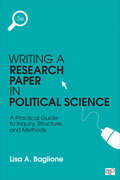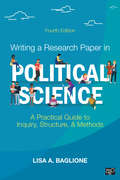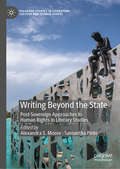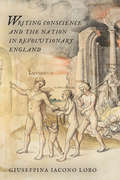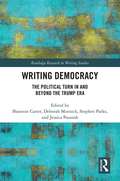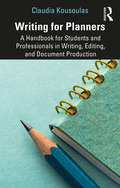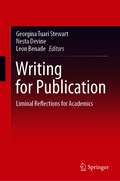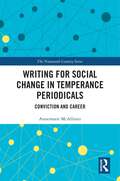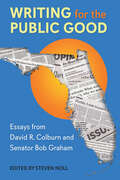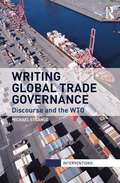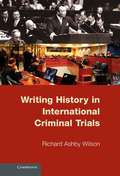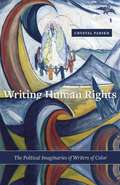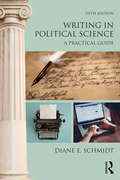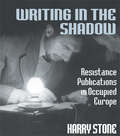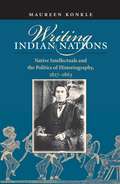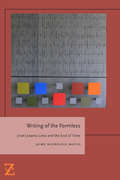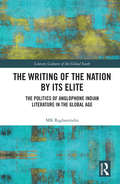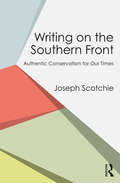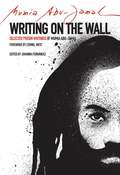- Table View
- List View
Writing a Research Paper in Political Science: A Practical Guide to Inquiry, Structure, and Methods
by Professor Lisa A. BaglioneIn Writing a Research Paper in Political Science, author Lisa Baglione breaks down the research paper into its constituent parts and shows students precisely how to complete each component. The author provides encouragement at each stage and faces pitfalls head on, giving advice and examples so that students move through each task successfully. Students are shown how to craft the right research question, find good sources and properly summarize them, operationalize concepts, design good tests for their hypotheses, and present and analyze quantitative and qualitative data. Even writing an introduction, coming up with effective headings and titles, presenting a conclusion, and the important steps of editing and revising are covered. Practical summaries, recipes for success, worksheets, exercises, and a series of handy checklists make this a must-have supplement for any writing-intensive political science course. In this Third Edition, updated sample research topics come from American government, gender studies, comparative politics, and international relations. And now, more extensive materials are available on the web, including checklists and worksheets that help students tackle each step, calendar ideas to help them complete their paper on time, and a glossary.
Writing a Research Paper in Political Science: A Practical Guide to Inquiry, Structure, and Methods
by Professor Lisa A. BaglioneIn Writing a Research Paper in Political Science, author Lisa Baglione breaks down the research paper into its constituent parts and shows students precisely how to complete each component. The author provides encouragement at each stage and faces pitfalls head on, giving advice and examples so that students move through each task successfully. Students are shown how to craft the right research question, find good sources and properly summarize them, operationalize concepts, design good tests for their hypotheses, and present and analyze quantitative and qualitative data. Even writing an introduction, coming up with effective headings and titles, presenting a conclusion, and the important steps of editing and revising are covered. Practical summaries, recipes for success, worksheets, exercises, and a series of handy checklists make this a must-have supplement for any writing-intensive political science course. In this Third Edition, updated sample research topics come from American government, gender studies, comparative politics, and international relations. And now, more extensive materials are available on the web, including checklists and worksheets that help students tackle each step, calendar ideas to help them complete their paper on time, and a glossary.
Writing a Research Paper in Political Science: A Practical Guide to Inquiry, Structure, and Methods
by Professor Lisa A. BaglioneEven students capable of writing excellent essays still find their first major political science research paper an intimidating experience. Crafting the right research question, finding good sources, properly summarizing them, operationalizing concepts and designing good tests for their hypotheses, presenting and analyzing quantitative as well as qualitative data are all tough-going without a great deal of guidance and encouragement. Writing a Research Paper in Political Science breaks down the research paper into its constituent parts and shows students what they need to do at each stage to successfully complete each component until the paper is finished. Practical summaries, recipes for success, worksheets, exercises, and a series of handy checklists make this a must-have supplement for any writing-intensive political science course.
Writing a Research Paper in Political Science: A Practical Guide to Inquiry, Structure, and Methods
by Professor Lisa A. BaglioneEven students capable of writing excellent essays still find their first major political science research paper an intimidating experience. Crafting the right research question, finding good sources, properly summarizing them, operationalizing concepts and designing good tests for their hypotheses, presenting and analyzing quantitative as well as qualitative data are all tough-going without a great deal of guidance and encouragement. Writing a Research Paper in Political Science breaks down the research paper into its constituent parts and shows students what they need to do at each stage to successfully complete each component until the paper is finished. Practical summaries, recipes for success, worksheets, exercises, and a series of handy checklists make this a must-have supplement for any writing-intensive political science course.
Writing America: Language And Composition In Context AP* Edition
by David A. Jolliffe Hephzibah RoskellyWe have designed Writing America: Language and Composition in Context AP* Edition so that it can be used as the foundational text in a course that emphasizes reading, writing, and analyzing texts. Writing America teaches reading as a dynamic, interactive process. It teaches writing as a craft, related to reading, that produces rich, purposeful, well-planned and well-executed texts. It teaches the structure and organization of texts, at the level of both the whole text and the sentence. It couches this instruction in an examination of vitally important works of American literature, art, and culture, accompanied by a study of contemporary pieces that unpack current thinking on the issues and themes raised by the historical works.
Writing and the Ancient State
by Wang HaichengWriting and the Ancient State explores the early development of writing and its relationship to the growth of political structures. The first part of the book focuses on the contribution of writing to the state's legitimating project. The second part deals with the state's use of writing in administration, analyzing both textual and archaeological evidence to reconstruct how the state used bookkeeping to allocate land, police its people, and extract taxes from them. The third part focuses on education, the state's system for replenishing its staff of scribe-officials. The first half of each part surveys evidence from Mesopotamia, Egypt, the Maya lowlands, Central Mexico, and the Andes; against this background the second half examines the evidence from China. The chief aim of this book is to shed new light on early China (from the second millennium BC through the end of the Han period, ca. 220 AD) while bringing to bear the lens of cross-cultural analysis on each of the civilizations under discussion. The compiling of lists - lists of names, or of names and numbers - is a recurring theme throughout all three parts. A concluding chapter argues that there is nothing accidental about the pervasiveness of this theme: in both origin and function, early writing is almost synonymous with the listing of names.
Writing Beyond the State: Post-Sovereign Approaches to Human Rights in Literary Studies (Palgrave Studies in Literature, Culture and Human Rights)
by Samantha Pinto Alexandra S. MooreThis book investigates the imaginative capacities of literature, art and culture as sites for reimagining human rights, addressing deep historical and structural forms of belonging and unbelonging; the rise of xenophobia, neoliberal governance, and securitization that result in the purposeful precaritization of marginalized populations; ecological damage that threatens us all, yet the burdens of which are distributed unequally; and the possibility of decolonial and posthuman approaches to rights discourses. The book starts from the premise that there are deep-seated limits to the political possibilities of state and individual sovereignty in terms of protecting human rights around the world. The essays explore how different forms, materials, perspectives, and aesthetics can help reveal the limits of normative human rights and contribute to the cultural production of new human rights imaginaries beyond the borders of state and self.
Writing Conscience and the Nation in Revolutionary England
by Giuseppina Iacona LoboExamining works by well-known figures of the English Revolution, including John Milton, Oliver Cromwell, Margaret Fell Fox, Lucy Hutchinson, Thomas Hobbes, and King Charles I, Giuseppina Iacono Lobo presents the first comprehensive study of conscience during this crucial and turbulent period. Writing Conscience and the Nation in Revolutionary England argues that the discourse of conscience emerged as a means of critiquing, discerning, and ultimately reimagining the nation during the English Revolution. Focusing on the etymology of the term conscience, to know with, this book demonstrates how the idea of a shared knowledge uniquely equips conscience with the potential to forge dynamic connections between the self and nation, a potential only amplified by the surge in conscience writing in the mid-seventeenth-century. Iacono Lobo recovers a larger cultural discourse at the heart of which is a revolution of conscience itself through her readings of poetry, prose, political pamphlets and philosophy, letters, and biography. This revolution of conscience is marked by a distinct and radical connection between conscience and the nation as writers struggle to redefine, reimagine, and even render anew what it means to know with as an English people.
Writing Democracy: The Political Turn in and Beyond the Trump Era (Routledge Research in Writing Studies)
by Shannon Carter Deborah Mutnick Jessica Pauszek Steve ParksWriting Democracy: The Political Turn in and Beyond the Trump Era calls on the field of writing studies to take up a necessary agenda of social and economic change in its classrooms, its scholarship, and its communities to challenge the rise of neoliberalism and right-wing nationalism. Grown out of an extended national dialogue among public intellectuals, academic scholars, and writing teachers, collectively known as the Writing Democracy project, the book creates a strategic roadmap for how to reclaim the progressive and political possibilities of our field in response to the "twilight of neoliberalism" (Cox and Nilsen), ascendant right-wing nationalism at home (Trump) and abroad (Le Pen, Golden Dawn, UKIP), and hopeful radical uprisings (Black Lives Matter, Occupy Wall Street, Arab Spring). As such, the book tracks the emergence of a renewed left wing in rhetoric and activism post-2008, suggests how our work as teachers, scholars, and administrators can bring this new progressive framework into our institutions, and then moves outward to our role in activist campaigns that are reshaping public debate. Part history, part theory, this book will be an essential read for faculty, graduate students, and advanced undergraduate students in composition and rhetoric and related fields focused on progressive pedagogy, university-community partnerships, and politics.
Writing for Planners: A Handbook for Students and Professionals in Writing, Editing, and Document Production
by Claudia KousoulasWriting is never easy, but this book can make it easier. With attentiveness and experience, Claudia Kousoulas gives readers applied writing, editing, and production approaches that provide a clear path to completing a document and tools that ensure it is engaging and professional. The book follows a project’s path from initial assignment and conception, through sorting out what’s significant, shaping it into a message, and guiding readers to an action. It addresses the different types of documents planners have to create, the different media they use, and the different audiences they address. Its strategies will help writers start a project and see it through to a clear and coherent piece of work that serves its purpose. This book will help planners meet the challenges of creating work that is accurate, creative, and useful. Students will find it helpful in providing professional standards and quick reference information, and professionals will carry it through their careers as a reference, and as a way to establish workplace standards and improve their own work.
Writing for Publication: Liminal Reflections for Academics
by Leon Benade Georgina Tuari Stewart Nesta DevineThis book focuses on academic writing and how academics who are experts in their fields can translate their expertise into publishable form. The magnitude and speed of the changes that are transforming the global academic landscape produce an ongoing need for literature that interprets the nature of academic work. This book arises from the background discipline of Education, which is a relatively new university subject that draws on the entire knowledge spectrum from the fine arts to the natural sciences. Each chapter addresses an aspect of the conditions of written academic labour in an age of digital publishing: its nature, how it works, and guidance for successful navigation. This book will provide helpful guidance to graduate students, researchers and teachers in universities and higher education, who are united by the challenges of this new world of academic publishing.
Writing for Social Change in Temperance Periodicals: Conviction and Career (The Nineteenth Century Series)
by Annemarie McAllisterThis book suggests alternative ways of looking at what made a writer, what people gained from writing, and explores the alternative world of temperance periodicals of the nineteenth and early twentieth century. It introduces some of the now-forgotten writers who, in their thousands, kept the Victorian periodical presses rolling, and the public entertained. Locating their writing in the context of their personal commitment, the study takes seven prolific writers who were outside what we now think of as the circuits of conventional publication and authorship, and looks at how they found ways to make their voices heard. Their absorption in a cause led them to forge impressive writing careers in a variety of genres and media, focusing around high-circulation temperance periodicals. Examining their cultural contributions as well as their professional lives confirms the importance of the temperance movement in the second half of the nineteenth century, and raises questions about distribution practices and values, and distinctions between ‘life’ and ‘work.’
Writing for the Public Good: Essays from David R. Colburn and Senator Bob Graham (Government and Politics in the South)
by David R. Colburn Bob GrahamInsights into modern American politics and society from two of Florida’s most influential public figures Writing for the Public Good presents a selection of over 100 important opinion pieces from David R. Colburn (1942‒2019) and Senator Bob Graham, two of the most influential public figures in contemporary Florida. Spanning 30 years and addressing a wide variety of topics that continue to be relevant today, these essays show the key role of Florida in modern American life and politics and illustrate the power of civic engagement in tackling issues facing the nation.Exemplifying public writing that connects with and informs readers everywhere, these pieces appeared as op-eds in outlets including the Miami Herald, the Tampa Bay Times, the Tampa Tribune, the Orlando Sentinel, the New York Times, the Washington Post, Politico, and Time. With style, intelligence, and thoughtfulness, Colburn and Graham examine subjects including the economy, race relations, public education, the environment, national intelligence, and international affairs. They look to history to give context to the social problems of today, and they point forward to constructive solutions that center on the role of citizen activism.Together, these essays chart the history of modern Florida, reflecting the state’s rise to a Sunbelt powerhouse that is often at the center of national conversations. Colburn and Graham challenge readers to consider and discuss different perspectives on current issues and, above all, to respond. Readers will come away with renewed hope that their actions can make a difference to improve society and will be inspired to work for a better tomorrow.A volume in the series Government and Politics in the South, edited by Sharon D. Wright Austin and Angela K. Lewis-Maddox
Writing Global Trade Governance: Discourse and the WTO (Interventions)
by Michael StrangeWriting Global Trade Governance operationalises a key post-structuralist methodology in order to expand understanding on the institution at the heart of the global political economy. Despite the WTO’s centrality and the growing popularity of methods utilizing discourse theory, no other text has yet demonstrated how these two fields of learning can be productively combined. The book seeks to move beyond existing literatures that assume the WTO to be a structure, institution or normative framework, in order to enquire into the discursive processes of identity formation that make the WTO both possible and contested. The book criticises conventional approaches that treat critical civil society as distinct to the WTO, arguing instead that it is only through including such social practices within the field of relations making the WTO that we can properly understand what makes the WTO work. The book presents an empirical analysis of the discursive character of the present-day WTO (including its formation and operation) and then moves on to evaluate how it is subject to change within a broader social context. The final stage of the book seeks to discuss the impact of the findings on future research, both on the WTO and other institutions. This work is a significant intervention in the literature on the World Trade Organization and the politics of global trade and social movements, and will be of great interest to students and scholars of global governance, discourse theory and international organizations
Writing History in International Criminal Trials
by Richard Ashby WilsonWhy do international criminal tribunals write histories of the origins and causes of armed conflicts? Richard Ashby Wilson conducted research with judges, prosecutors, defense attorneys and expert witnesses in three international criminal tribunals to understand how law and history are combined in the courtroom. Historical testimony is now an integral part of international trials, with prosecutors and defense teams using background testimony to pursue decidedly legal objectives. In the Slobodan Milošević trial, the prosecution sought to demonstrate special intent to commit genocide by reference to a long-standing animus, nurtured within a nationalist mindset. For their part, the defense called historical witnesses to undermine charges of superior responsibility, and to mitigate the sentence by representing crimes as reprisals. Although legal ways of knowing are distinct from those of history, the two are effectively combined in international trials in a way that challenges us to rethink the relationship between law and history.
Writing Human Rights: The Political Imaginaries of Writers of Color
by Crystal ParikhThe legal texts and aspirational ideals of human rights are usually understood and applied in a global context with little bearing on the legal discourse, domestic political struggles, or social justice concerns within the United States. In Writing Human Rights, Crystal Parikh uses the international human rights regime to read works by contemporary American writers of color—Toni Morrison, Chang-rae Lee, Ana Castillo, Aimee Phan, and others—to explore the conditions under which new norms, more capacious formulations of rights, and alternative kinds of political communities emerge.Parikh contends that unlike humanitarianism, which views its objects as victims, human rights provide avenues for the creation of political subjects. Pairing the ethical deliberations in such works as Beloved and A Gesture Life with human rights texts like the United Nations Convention Against Torture, she considers why principles articulated as rights in international conventions and treaties—such as the right to self-determination or the right to family—are too often disregarded at home. Human rights concepts instead provide writers of color with a deeply meaningful method for political and moral imagining in their literature.Affiliating transnational works of American literature with decolonization, socialist, and other political struggles in the global south, this book illuminates a human rights critique of idealized American rights and freedoms that have been globalized in the twenty-first century. In the absence of domestic human rights enforcement, these literatures provide a considerable repository for those ways of life and subjects of rights made otherwise impossible in the present antidemocratic moment.
Writing in Political Science: A Practical Guide
by Diane E. SchmidtA complete, professional resource for writing an effective paper in all subfields of political science, Diane Schmidt’s 25th anniversary edition provides students with a practical, easy-to-follow guide for writing about political ideas, events, policies, passions, agendas, and processes. It offers additional formats and guidelines focusing on the growing use of social media and the need for professional communication in blogs, tweets, forums, media sites, lectures on demand, and postings on websites. A collection of student papers shows students how to write well for better grades. After reading Writing in Political Science students will know how to: choose and narrow a research topic; formulate a research agenda; quickly locate reputable information online; execute a study and write up findings; use the vocabulary of political science discourse; follow the criteria used to evaluate student assignments when writing; apply writing skills to an internship, civic engagement project, or grant proposal; and manage and preserve achievements for career development. New to the Fifth Edition Locating Research Materials: Updated links to all sources, expansion of appropriate sources to include mobile sources available through tweets, blogs, forums, and other informal communication; expansion of tools to include database searching; use of smart phone technology; and evaluation of source reliability to include commercial sources, Wikipedia, media sites, social media, and lectures on demand. Creating Evidence: Evaluating data sources on the web including government databases, non-profits, and special interest/commercial data; and using collaborative forms of data collection. Includes a new section on Memorandums of Conversations (MEMCON), essential in recent political controversies. Manuscript Formatting and Reference Styles: Updated examples of citing internet sites, blogs, forums, lectures on demand, and YouTube. Format/Examples: Updated exam-writing treatment to include on-line, e-learning, open-book exams, media applications examples using YouTube and online media; restored legal briefs treatment; revised proposal examples; revised PowerPoint instructions to include diversity considerations; expanded formula for standard research papers to include wider disciplinary treatment, expanded communication techniques, format and examples of appropriate posting for social media and organizational websites, expanded internship treatment, inclusion of needs-assessment format and examples. Career Development: Restoration of 3rd edition chapter and expansion of professional portfolio building including vitae, resume, cover letters, letters of intent, statement of purpose, and skills/competency discussions. Updated citations for changes in The Chicago Manual of Style, 17th Edition, 2017 and The MLA Handbook for Writers of Research Papers, 8th Edition, 2016.
Writing in the Shadow: Resistance Publications in Occupied Europe
by Harry StoneThe first complete national and international survey in the English language of the clandestine newspapers and books published in the occupied countries of Europe during the Second World War.A man with earphones crouching in the attic listening in with a crystal set, a prisoner writing fearfully even in the condemned cell, youths taking courses in weightlifting so as to be able to carry cases of lead type with apparent ease: these are just some of the people who helped produce clandestine newspapers and books in the occupied countries of Europe during the Second World War. Writing in the Shadow describes the risks these people ran and the ingenuity and brilliant improvisation they used to hoodwink the Nazis and distribute newsletters to tens of thousands of people.
Writing Indian Nations
by Maureen KonkleIn the early years of the republic, the United States government negotiated with Indian nations because it could not afford protracted wars politically, militarily, or economically. Maureen Konkle argues that by depending on treaties, which rest on the equal standing of all signatories, Europeans in North America institutionalized a paradox: the very documents through which they sought to dispossess Native peoples in fact conceded Native autonomy. As the United States used coerced treaties to remove Native peoples from their lands, a group of Cherokee, Pequot, Ojibwe, Tuscarora, and Seneca writers spoke out. With history, polemic, and personal narrative these writers countered widespread misrepresentations about Native peoples' supposedly primitive nature, their inherent inability to form governments, and their impending disappearance. Furthermore, they contended that arguments about racial difference merely justified oppression and dispossession; deriding these arguments as willful attempts to evade the true meanings and implications of the treaties, the writers insisted on recognition of Native peoples' political autonomy and human equality. Konkle demonstrates that these struggles over the meaning of U.S.-Native treaties in the early nineteenth century led to the emergence of the first substantial body of Native writing in English and, as she shows, the effects of the struggle over the political status of Native peoples remain embedded in contemporary scholarship.
Writing Neoliberal Values: Rhetorical Connectivities and Globalized Capitalism (Rhetoric, Politics and Society)
by Rachel C. RiednerThis book examines human-interest stories, unpacking from them violence inherent to neoliberalism, and considers if it is possible to find in these stories hints of people and labour that suggest other narratives.
Writing Neoliberal Values: Rhetorical Connectivities and Globalized Capitalism (Rhetoric, Politics and Society)
by Rachel C. RiednerThis book examines human-interest stories, unpacking from them violence inherent to neoliberalism, and considers if it is possible to find in these stories hints of people and labour that suggest other narratives.
Writing of the Formless: Jose Lezama Lima and the End of Time
by Jaime Rodríguez MatosIn this book, Jaime Rodríguez Matos proposes the “formless” as a point of departure in thinking through the relationship between politics and time. Thinking through both literary and political writings around the Cuban Revolution, Rodríguez Matos explores the link between abstract symbolic procedures and various political experiments that have sought to give form to a principle of sovereignty based on the category of representation. In doing so, he proposes the formless as the limit of modern and contemporary reflections on the meaning of politics while exploring the philosophical consequences of a formless concept of temporality for the critique of metaphysics. Rodríguez Matos takes the writing and thought of José Lezama Lima as the guiding thread in exploring the possibility of a politicity in which time is imagined beyond the disciplining functions it has had throughout the metaphysical tradition—a time of the absence of time, in which the absence of time no longer means eternity.
The Writing of the Nation by Its Elite: The Politics of Anglophone Indian Literature in the Global Age (Literary Cultures of the Global South)
by MK RaghavendraThis volume examines the idea of India as it emerges in the writing of its anglophone elite, post-2000. Drawing on a variety of genres, including fiction, histories, non-fiction assessments – economic, political, and business – travel accounts, and so on, this book maps the explosion of English-language writing in India after the economic liberalization and points to the nation’s sense of its growing importance as a producer of culture. From Ramachandra Guha to William Dalrymple, from Arundhati Roy to Pankaj Mishra, from Jhumpa Lahiri to Amitav Ghosh, from Amartya Sen to Gurcharan Das, from Barkha Dutt to Tarun Tejpal, this investigation takes us from aesthetic imaginings of the nation to its fractured political fault lines, the ideological predispositions of the writers often pointing to an asymmetrically constituted India. A major intervention on how postcolonial India is written about and imagined in the anglophone world, this book will be of great interest to scholars and researchers of cultural studies, literature, history, and South Asian studies. It will also be of interest to general readers with an inclination towards India and Indian writing.
Writing on the Southern Front: Authentic Conservatism for Our Times
by Joseph ScotchieFor traditionalists, the conservative ascendency of the 1980s turned out to be a major disappointment. With the triumph of multiculturalism and political correctness, liberalism seemed to move from strength to strength. Still, a stout number of southern conservative writers plunged forward, and their themes of populism, immigration, and cultural integrity are seeing a contemporary resurgence. Discussing a wide array of authors who worked in a variety of genres, Joseph Scotchie celebrates those unreconstructed champions who fought the culture wars of their times with a special learning and vigor. Also included in this collection are creative artists who kept the flame of literature alive, providing visions of possibilities that only genre can provide.
Writing on the Wall
by Mumia Abu Jamal Johanna Fernandez"Revolutionary love, revolutionary memory and revolutionary analysis are at work in every page written by Mumia Abu-Jamal ... His writings are a wake-up call. He is a voice from our prophetic tradition, speaking to us here, now, lovingly, urgently. Black man, old-school jazz man, freedom fighter, revolutionary-his presence, his voice, his words are the writing on the wall."-Cornel West, from the forewordFrom the first slave writings to contemporary hip hop, the canon of African American literature offers a powerful counter-narrative to dominant notions of American culture, history and politics. Resonant with voices of prophecy and resistance, the African American literary tradition runs deep with emancipatory currents that have had an indelible impact on the United States and the world. Mumia Abu-Jamal has been one of our most important contributors to this canon for decades, writing from the confines of the U.S. prison system to give voice to those most silenced by chronic racism, impoverishment and injustice.Writing on the Wall is a selection of more than 100 previously unpublished essays that deliver Mumia Abu-Jamal's essential perspectives on community, politics, power, and the possibilities of social change in the United States. From Rosa Parks to Edward Snowden, from the Trail of Tears to Ferguson, Missouri, Abu-Jamal addresses a sweeping range of contemporary and historical issues. Written mostly during his years of solitary confinement on Death Row, these essays are a testament to Abu-Jamal's often prescient insight, and his revolutionary perspective brims with hope, encouragement and profound faith in the possibility of redemption."Greatness meets us in this book, and not just in Mumia's personal courage and character. It's in the writing. This is art with political power, challenging institutional injustice in the U.S. while catalyzing our understanding, memory and solidarities for liberation and love. Writing on the Wall can set the nation aflame-yes, for creating new possible worlds."-Mark Lewis Taylor, Professor of Theology and Culture, Princeton Theological SeminaryMumia Abu-Jamal is an award-winning journalist and author of two best-selling books, Live From Death Row and Death Blossoms.Johanna Fernández is a Fulbright Scholar and Professor of History at Baruch College in New York City.Cornel West is a scholar, philosopher, activist and author of over a dozen books including his bestseller, Race Matters. He appears frequently in the media, and has appeared on Real Time with Bill Maher, The Colbert Report, CNN and C-Span as well as Tavis Smiley. Baruch College of the City University of New York where she teaches 20th Century US history and African American History. She is author of the forthcoming When the World Was Their Stage: A History of the Young Lords Party, 1968-1976 (Princeton University Press). Fernandez is the writer and producer of the film, Justice on Trial: the Case of Mumia Abu-Jamal and she is featured in the critically acclaimed documentary about Mumia Abu-Jamal, Long Distance Revolutionary. She has appeared in Democracy Now!, Hannity, Megyn Kelley, Al Jazeera, and The New York Times. She is a coordinator of the Campaign to Bring Mumia Home.CORNEL WEST is a scholar, philosopher, activist and author of over a dozen books including his bestseller, Race Matters.
